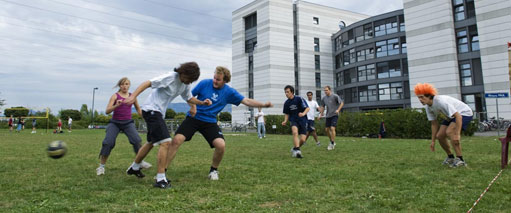
ATLAS e-News
23 February 2011
Young@CERN finds its voice
9 February 2009

Playing football on the lawn in front of Building 40
Pieter Everaerts is a man on a mission. As a CMS grad student, he set up the social group “Young@CERN” just over a year ago as a means for young people arriving at CERN to get to know one another, and to encourage cohesion within the existing student community. Now he has ambitious plans for the group to gain official weight on some of the many committees and boards across CERN.
“In some way I’d always thought about making it more formal, but at the beginning we needed to start with something easier” says Pieter. They began in the obvious place – with drinks – “so that people would get to know each other.”
His ultimate aim is to facilitate information flow to and within the student community at CERN. Grad students do a lot of work on the experiments, but often find that they have to employ somewhat inventive methods of piecing an overall picture together, in the absence of any official channels of information. Keeping up-to-date is just as important to the students as the professors, argues Pieter: “For me, for example, I can’t graduate before there is data, so it’s essential to know how progress is going.”
Pieter is one of the lucky ones, whose supervisor keeps him well in the loop, but even so, he says, “It’d be nice to have some direct connection to the Collaboration Boards.” He is proposing that there be a student representative on the Collaboration Board of each of the major experiments. These representatives would then get together monthly and discuss the latest developments in an open meeting, which all students would be welcome to attend and voice their opinions.
“We’ll also send out a one-page email each month: A complete summary of what’s happened in the different experiments, the latest plans with the LHC, what social activities we’re going to organise and so on,” he says, adding, “People can then subscribe to other mailing lists that will have more frequent updates, if they choose.”
Pieter set the wheels of his plan in motion in mid-January, gathering around 20 volunteers off the back of a preliminary call-to-arms email. Kerstin Jon-And, Chair of the ATLAS Collaboration Board, put Pieter in touch with two post-docs currently sitting on the Advisory Board to the ATLAS Collaboration Board, and he also managed to track down two post-docs who have been recently appointed to similar positions within CMS. These individuals provide some initial links between the student community and the management, and have already begun feeding information back at Young@CERN meetings.
“CMS have told me that, for now, this is how they’re doing it. The plan is that they’ll invite us for pizza and beer in March, see how we’re evolving, and perhaps after that they’ll give us the opportunity for students to be able to get information directly from the Collaboration Board,” says Pieter.
The reaction from ATLAS is also looking promising. "I think a student organisation at CERN would be positive from several aspects,” says Kerstin Jon-And. “Students from different countries and different experiments would get a network and issues particularly important for students at CERN could be brought to attention in various bodies.”
Following the lead of ATLAS and CMS, Pieter is now looking into whether post-docs or students could be given spots on the Advisory Boards or Collaboration Boards on the other experiments.
“There’s actually also a space for one student on the Staff Association, which could be useful for the CERN students,” says Pieter, “and it’d be nice if we could have someone more geared towards the LHC as well.”
In the meanwhile, he plans more frequent and better-organised social events, and a broadening of the scope of the student lecture programme – to include talks on economics, international politics, humanitarian organisations and other hot topics from the Geneva area.
Anyone wanting to get involved – be that representing students, organising events, running a website, maintaining a mailing system, or taking care of finances – should contact Pieter directly at peveraer![[at]](../images_09/at.gif) mit.edu.
mit.edu.

Ceri PerkinsATLAS e-News
|